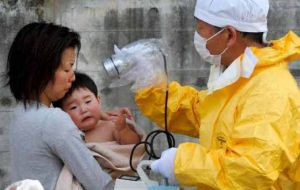MercoPress. South Atlantic News Agency
Japanese officials admit radiation levels at nuclear plant are eight times higher
 People within a 20km exclusion zone around the plant had to leave; those living between 20km and 30km should remain indoors.
People within a 20km exclusion zone around the plant had to leave; those living between 20km and 30km should remain indoors. Explosions at a Japanese quake-stricken nuclear plant have led to radiation levels that can affect human health, a senior Japanese official has said. Prime Minister Naoto Kan has urged those living within 30km of the plant to stay indoors.
Earlier, reactor 2 at the Fukushima Daiichi plant was hit by a blast - the third reactor to explode in four days - leading to fears of a meltdown.
The crisis was sparked by a 9.0-magnitude quake and tsunami on Friday. Thousands of people are believed to have died and thousands remain disappeared.
A fresh explosion rocked reactor 2 at the Fukushima Daiichi plant - 250km north-east of Tokyo - in the early hours of Tuesday.
“Now we are talking about levels that can impact human health,” said Chief Cabinet Secretary Yukio Edano.
He stressed that such levels were recorded at the plant and that the “further away you get from the power plant or reactor, the value should go down”.
In his televised address, Prime Minister Kan said: “There is still a very high risk of more radiation coming out.”
He added that the last remaining people within a 20km exclusion zone around the plant had to leave, and that those living between 20km and 30km -from the site should remain indoors.
Radiation levels around Fukushima for one hour's exposure rose to eight times the legal limit for exposure in one year, said the plant's operator, the Tokyo Electric Power Co (Tepco).
The radiation reading at 23:31 GMT climbed to 8,217 micro-sieverts an hour from 1,941 about 40 minutes earlier, Tepco said. The annual legal limit is 1,000 microsieverts.
A fire which briefly broke out at the plant's reactor 4 on Tuesday is also believed to have led to radioactive leaks.
Higher radiation levels were recorded on Tuesday south of Fukushima, Kyodo news agency reported. Levels in Tokyo were higher than normal, but officials said there were no health dangers.
Shares on the Tokyo stock exchange plummeted 13% before recovering slightly. The leading Nikkei index ended the day 10.55% lower. It had already fallen by 7% on the previous day.
On Monday, a hydrogen blast at the Fukushima plant's reactor 3 was felt 40km away. It followed a blast at reactor 1 on Saturday.
All explosions have been preceded by cooling system breakdowns. Engineers are trying to prevent meltdowns by flooding the chambers of the nuclear reactors with sea water.
Japan's nuclear safety agency said it suspects Tuesday's blast may have damaged the vessel that holds reactor 2.
The BBC's Chris Hogg in Tokyo says that would make it a more serious incident than the previous explosions, which were thought just to have damaged the buildings that housed the reactors
Meanwhile, five days after the tsunami triggered by the earthquake, the relief operation is continuing. The latest official death toll stands at about 2,400 - but some estimates suggest 10,000 may have been killed.
Thousands are still unaccounted for - including hundreds of tourists - while many remote towns and villages have not been reached. More than 500,000 people have been made homeless and the government has deployed 100,000 troops to lead the aid effort.




Top Comments
Disclaimer & comment rulesCommenting for this story is now closed.
If you have a Facebook account, become a fan and comment on our Facebook Page!